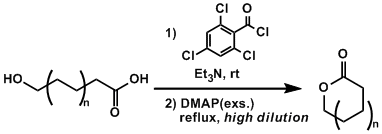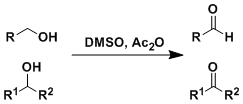General Characteristics In the method developed by Yamaguchi, hydroxycarboxylic acids (“seco-acids”) are converted into reactive acid anhydrides using 2,4,6-trichlorobenzoyl chloride ...
Author Archive
Organocuprates
General Characteristics The organocuprate reagents [R2CuLi] prepared from copper(I) sources and two equivalents of organolithiums work as strong nucleophiles in 1,4-additions to α,β-unsaturated ...
Conversion of Alcohols into Alkanes
General Characteristics Direct reduction of alcohols to alkanes is generally difficult. The conversion usually requires a two-step sequence involving the conversion of alcohols into leaving groups ...
Albright-Goldman Oxidation
General Characteristics The Swern-type oxidation of alcohols using acetic anhydride as the activator of DMSO. The reaction times are relatively long (12-24 h). This reaction is useful for the ...
Ullmann Coupling
General Characteristics The Ullmann coupling is the reductive coupling of aryl halides mediated by copper reagents. This reaction is used for homocoupling purposes except for certain substrate ...
Gabriel Amine Synthesis
General Characteristics The synthesis of primary amines by way of alkylation of phthalimide is called the Gabriel amine synthesis. The use of DMF as the solvent generally increases the yield by ...
Wacker Oxidation
General Characteristics The Wacker oxidation was originally developed as the process of producing acetaldehyde from ethylene using the PdCl2-CuCl2 cocatalytic system. Molecular oxygen can be used as ...
Corey-Kim Oxidation
General Characteristics The oxidation of alcohols based on the dimethylsulfide-NCS system is known as the Corey-Kim oxidation. The oxidation of primary alcohols stops at the aldehyde oxidation state. ...
Michaelis-Arbuzov Reaction
General Characteristics The reaction between phosphorous acid esters (phosphites) and alkyl halides gives phosphonic acid esters. When the phosphite and the alkyl halide have the same alkyl group, ...
Reformatsky Reaction
General Characteristics In the Reformatsky reaction, the enolates formed from α-haloesters and zinc metal add to aldehydes and ketones. Zinc enolates are less basic, less reactive, and thus more ...










